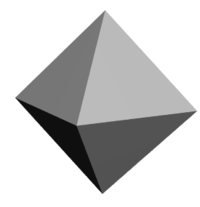Difference between revisions of "Form Factor:Octahedron"
KevinYager (talk | contribs) |
KevinYager (talk | contribs) |
||
| (One intermediate revision by the same user not shown) | |||
| Line 8: | Line 8: | ||
==Pyramid== | ==Pyramid== | ||
| − | The Octagon shaped can be considered to be formed from two square-based pyramids. Similarly the form factor can be computed from appropriate summation of two [[Form_Factor:Pyramid|pyramid form factors]]. | + | The Octagon shaped can be considered to be formed from two square-based pyramids. Similarly the [[form factor]] can be computed from appropriate summation of two [[Form_Factor:Pyramid|pyramid form factors]]. |
| + | |||
| + | ==See Also== | ||
| + | * [http://scripts.iucr.org/cgi-bin/paper?ks5428 The chord-length probability density of the regular octahedron] S. Ciccariello ''J. Appl. Cryst.'' 2014, 47 [http://dx.doi.org/10.1107/S1600576714011121 doi: 10.1107/S1600576714011121] | ||
Latest revision as of 16:58, 29 June 2014
Equations
For a regular octahedron of edge-length 2R
- Volume
- Projected (xy) surface area
- Surface area
Pyramid
The Octagon shaped can be considered to be formed from two square-based pyramids. Similarly the form factor can be computed from appropriate summation of two pyramid form factors.
See Also
- The chord-length probability density of the regular octahedron S. Ciccariello J. Appl. Cryst. 2014, 47 doi: 10.1107/S1600576714011121



